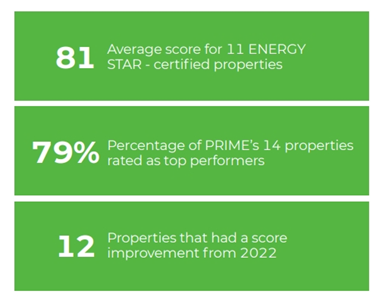Environmental Impact
As a responsible real estate investment trust, PRIME is unwavering in its commitment to minimising the environmental footprint of our operations and championing sustainability across our portfolio. Recognising the pivotal role of the built environment in global greenhouse gas emissions, we are resolute in mitigating our carbon footprint through effective energy management and the integration of innovative solutions.
Our inaugural Environmental Policy was implemented in December 2022. Our Environmental Policy meticulously addresses the environmental impact of our portfolio assets. It acknowledges our role in contributing to Greenhouse Gas (“GHG”) emissions and underscores the direct financial and environmental benefits derived from efficient environmental management and operations. The policy underscores our pledge to prioritise the physical impact of our real estate portfolio, preserving resources and lessening our environmental impact. Our objectives encompass lowering GHG emissions and consumption, improving utility efficiencies, enhancing the workplace environment, and establishing a competitive advantage for stakeholders
In adherence to this policy, we will consider conducting environmental site assessments or climate risk assessments by a third-party expert prior to the acquisition of new assets. Outcomes will be evaluated as part of the investment and due diligence processes. Further details on other environmental aspects are covered in relevant sections below. In FY2023, we completed climate risk assessments through the S&P Global Climanomics platform for all existing properties which has informed our climate risk mitigation action plans outlined in the TCFD Disclosure section of this report.
Our dedication extends to evaluating and mitigating the environmental impact of our properties, which encompasses energy consumption, water usage, and waste generation. Various efficiency improvement projects and best practices have been implemented and innovative technologies were utilised, underscoring our commitment to reducing environmental impact.
Energy Star1 Performance for FY2023

For more information, please refer to page 99 to 105 of PRIME's 2023 Annual Report.
1 ENERGY STAR score rates the building's energy performance relative to similar buildings nationwide. Expressed on a 1-100 scale, a higher score denotes better energy efficiency. A score of 50 represents median energy performance, while a score of 75 or higher indicates that the building is a top performer. More information is available at: https://www.energystar.gov/buildings/benchmark/understand_metrics/how_score_calculated
